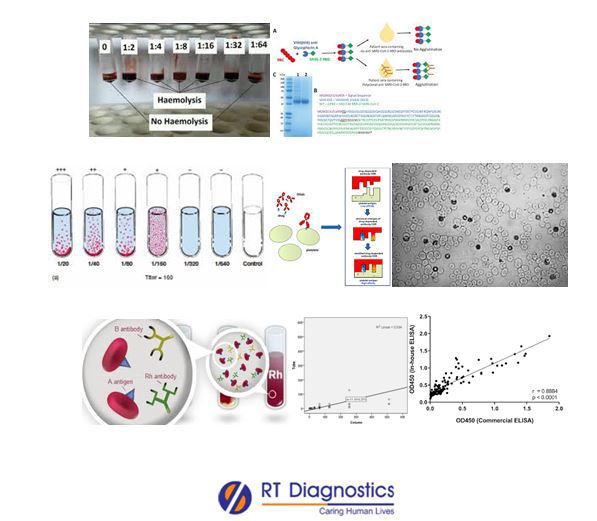RH – Antibody Titer:
Why RH-Antibody Titer Test?
CLINICAL INFORMATION
Rh is derived from the use of the blood of rhesus monkeys in the basic laboratory test for screening to determine the presence of Rh antigen in human blood. Hence Rhesus or Rh factor was named for red cell surface antigen after the monkeys in which it was discovered. Rhesus (Rh) factor is an inherited (baby can inherit Rh factor from either parent) protein found on the surface of RBCs. Rh factor is an important test for classification in blood transfusion since it indicates if the blood groups of two people are compatible or not (fit for blood transfusion). Thus the presence of Rh protein indicates an Rh-positive test result and likewise, the absence of Rh protein in red blood cells gives an Rh-negative test result. Moreover, this RhoGAM test is significant during pregnancy (especially if the pregnant mother is Rh-negative, while her baby in the fetus is Rh-positive – because the expecting mother’s blood might produce anti-D antibodies known as Rh-incompatibility and hence if Rh antibodies are not yet produced then an injection of Rh immunoglobulin may be required since it prevents the body from producing Rh antibodies during pregnancy). Usually (during her first pregnancy) the blood of the pregnant mother doesn’t mix with the baby’s blood during pregnancy (nevertheless, an antibody screening during the first trimester or 28 weeks of pregnancy may be performed during the antenatal (tests) care to detect the presence of antibodies to Rh-positive blood). However, the scanty amount of the baby’s blood (Rh positive) may come in contact with the pregnant mother’s blood (Rh-negative) during delivery while bleeding or abdominal trauma during pregnancy. Hence this sensitization (becomes immune) may lead to the production of Rh antibodies, which may affect subsequent pregnancies (in the future) for the mother if the child’s blood group is Rh positive (since these Rh antibodies can cross the placenta and damage the baby’s RBCs and result in life-threatening anaemia with jaundice due to excess bilirubin). Complication leads to Rhesus disease (ErythroblastosisFetalis or hemolytic disease of the newborn – HND) is caused by a mix of blood types between a pregnant mother (RhD negative) and her unborn baby (RhD positive) blood type. Untreated cases in subsequent pregnancies may face abortion, miscarriage, ectopic pregnancy, molar pregnancy, abdominal trauma, bleeding during pregnancy, breech presentation of the fetus in the uterus, complications during delivery etc. signs and symptoms (clinical manifestations) of Rh disease include dark yellow coloured amniotic fluid due to high concentrations of bilirubin, signs of hydropsfetalis (extra fluid filled-up in fetal stomach, lungs, scalp etc cause severe edema), ultrasound imaging studies show enlarged heart, hepatosplenomegaly, signs of anaemia, tachycardia, tachypnea, lack of energy, swelling under the skin, large abdomen, blood test of the expectant mother for the presence of Rh-positive antibodies etc. Additional tests include amniocentesis, chorionic villus sampling, cordocentesis, percutaneous umbilical cord blood sampling or fetal blood sampling etc. Other tests include imaging studies like ultrasound etc.

General Instructions:
Sample Requirement:Specimen - Blood sample collected from the vein. Test Preparation: None.
NOTE - Sample for specimen collections may vary based on the patient’s condition / cases according to patient’s presenting complaints / signs or symptoms:
SPECIMEN REQUIREMENT (Special or Rare Cases) - As instructed and guided by Physician / Clinician / Pathologist / as per Laboratory’s requirements, according to procedures and protocols.
This Multi-Specialty Clinical Referral Laboratory RT DIAGNOSTICS provides precise and accuracy tests with an extensive range of testing service to the medical centers to help in the diagnosis and identification of pathology in the test specimens for infectious diseases and also to evaluate the function of organ systems of the patient. It prevents further complications and helps to stabilize and restore health to near normalcy at the earliest without delay.



